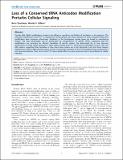Loss of a Conserved tRNA Anticodon Modification Perturbs Cellular Signaling
Author(s)
Zinshteyn, Boris; Gilbert, Wendy
DownloadZinshteyn-2013-Loss of a Conserved.pdf (2.854Mb)
PUBLISHER_CC
Publisher with Creative Commons License
Creative Commons Attribution
Terms of use
Metadata
Show full item recordAbstract
Transfer RNA (tRNA) modifications enhance the efficiency, specificity and fidelity of translation in all organisms. The anticodon modification mcm[superscript 5]s[superscript 2]U[superscript 34] is required for normal growth and stress resistance in yeast; mutants lacking this modification have numerous phenotypes. Mutations in the homologous human genes are linked to neurological disease. The yeast phenotypes can be ameliorated by overexpression of specific tRNAs, suggesting that the modifications are necessary for efficient translation of specific codons. We determined the in vivo ribosome distributions at single codon resolution in yeast strains lacking mcm[superscript 5]s[superscript 2]U. We found accumulations at AAA, CAA, and GAA codons, suggesting that translation is slow when these codons are in the ribosomal A site, but these changes appeared too small to affect protein output. Instead, we observed activation of the GCN4-mediated stress response by a non-canonical pathway. Thus, loss of mcm[superscript 5]s[superscript 2]U causes global effects on gene expression due to perturbation of cellular signaling.
Date issued
2013-08Department
Massachusetts Institute of Technology. Department of BiologyJournal
PLoS Genetics
Publisher
Public Library of Science
Citation
Zinshteyn, Boris, and Wendy V. Gilbert. “Loss of a Conserved tRNA Anticodon Modification Perturbs Cellular Signaling.” Edited by Gregory P. Copenhaver. PLoS Genetics 9, no. 8 (August 1, 2013): e1003675.
Version: Final published version
ISSN
1553-7404
1553-7390